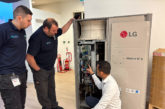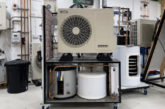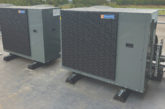
Aaron McLeish, Director of Together We Count Limited (accountancy firm) and author of the ‘The Quote Handbook – Essential steps to building the perfect boiler quote’ chats to PHPI about the fundamentals of running a small business.
Q. Running a business successfully can be tough for anyone unfamiliar with the tasks required. What would be your main tips for any installer aspiring to run a business or for those already at the helm?
Get your pricing right. Make sure you charge what you are worth. What you invoice to your customers is the top line, i.e. that is what you will receive in your bank when they pay you. That resource then allows you to pay for everything else required to run a business, such as merchants, software, advertising, banks, insurance, vans, tools, your accountant etc.
It is so important that your pricing is profitable. By thinking you are being nice to your customers by undercharging will have a detrimental effect on your business, so make sure you have good profit margins and price your jobs suitably based on complexity, urgency and value to the customer. Plumbing and heating businesses often get fixated on charging hourly rates, I feel that rates charged need to be fluid, tested and adjusted constantly to account for the varying degree of works.
Q. We know that creating the perfect boiler quotation is a passion, and you have written a book on the topic. What are the main ingredients to creating the perfect quotation that can help win the job?
I come across a lot of plumbing and heating businesses that slack when it comes to writing quotations. Some people might just send a text, some people might just send a quote from their accounting software, which in effect is just a glorified invoice.
I think plumbing and heating businesses need to up their game when it comes to producing quotations. They need to be detailed, they need to explain to the customer, the benefits of what the installation can do for them. For example, installing a boiler is a feature. You need to let the customer know what the benefits of that are. As a simple explanation, the benefit is that they will have heating and hot water, improved water pressure, and maybe reduced bills. Always explain and clearly communicate the benefits to the customer (not just the features).
I am also a strong advocate of giving your customers a choice in quotations, being a choice of bronze, silver and gold packages. This then allows a customer to buy at a budget of their choosing. There are countless more golden nuggets explained in the book.
Q. Installers can often find themselves short of time, running from one job to the next. Do you have any tips on how to save time on running a business, freeing up time for other things?
It’s all about systems, documenting what you are doing and creating templates. I often find that plumbing and heating business owners use evenings and weekends to do their paperwork, write emails, produce quotations etc. Now, if the business was to systemise the admin i.e. create templates for everything they do then admin tasks can be a copy-and-paste procedure and in doing so you are not having to type multiple emails and think of different responses for everyone. Literally regurgitate information which you have previously put together.
Q. There is a lot of red-tape and admin around running your own business, what kind of things can be done to make things run more smoothly?
Again, systems! Everything I have said in the previous answer is relevant here. Make sure you are consistent with all that you do and keep accurate records. If you have a team around you make sure you are all singing from the same hymn sheet by documenting your businesses procedures. If you don’t yet have a team then begin documenting your systems and processes so that when you are ready to expand, you already have standard operating procedures (SOPs) to be used as a training tool which can be easily followed by anyone.
Keeping accurate accounting records is important too. It makes things much easier when it comes to financial reporting. Good information in, good information out.
Q. Although the idea of employing an additional installer or taking on an apprentice can be daunting, to grow a small plumbing business an extra pair of hands (or two) is often needed. How should a business owner approach employing an additional person?
As I’m an accountant I’m going to answer this from a financial perspective. It comes down to money. But not just money; it’s predictable monthly recurring revenue. By taking on additional employees you’re going to have a weekly or monthly wage costs as well as all of the other associated costs such as a van, IT, training, insurances, pension and national insurance to commit to. That can be daunting, but if you structure your business in a way that makes it a good cash-generating business then taking on additional outgoings (wages) is less daunting.
For example, as a business you may have £200k of work in the pipeline, you have a quote success rate of 60%, therefore potential £120k of work should convert, knowing this information will help in assessing if your business can justify and afford a new staff.
On a smaller scale you may have customers on monthly subscriptions for boiler services and maintenance plans, you know that X amount is going to be landing into your bank account every month. You can therefore match incoming with outgoing commitments to ensure your always cash flow positive in your business. Making sure you’ve got sufficient leads, sufficient money and sufficient customers to service your business’s outgoings makes it so much easier to grow a business in a cash-positive manner.
So, when taking on staff, ensure that you have enough consistent work to fill one’s workload, ensure that the salaries and additional employee costs are more than covered.
Aaron is the director of Together We Count (TWC) and author of ‘The Quote Handbook – Essential Steps to Building the Perfect Boiler Quote’. TWC is an accountancy firm for tradespeople and specialist accountants for plumbing and heating businesses. Aaron has helped countless tradespeople build successful businesses.













